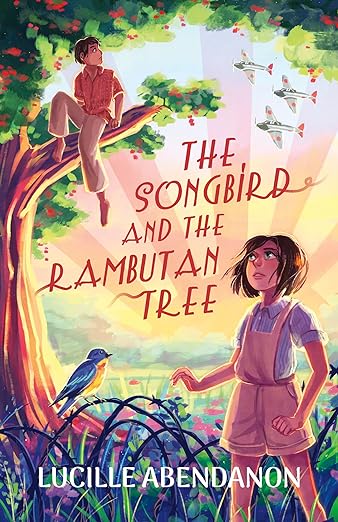The Songbird and the Rambutan Tree
Represented by Thérèse Coen
Batavia, Dutch East Indies, 1942.
Emmy has the voice of an angel but hasn’t sung a note since a family tragedy. With war looming, her father plans to ship her off to a singing school in England for safety. But all Emmy wants to do is stay in Batavia with her best friend, Bakti, even if it means putting up with her snooty classmate, Violet. Then the Japanese army invades—and as war erupts in the Dutch East Indies, Emmy’s world falls apart.
When her own actions sabotage her chance to evacuate the island, Emmy is captured and confined in the Tjideng prisoner-of-war camp with other women and children. Separated from her family and friends, and silenced by her grief, Emmy will need all her strength to survive the war, find her voice, and reclaim her freedom.
The Songbird and the Rambutan Tree is Lucille Abendanon’s debut novel and is inspired by a lifetime of conversations with her Oma Emmy, who was a prisoner of war in the Tjideng internment camp during World War II.
Reviews
“This is an astonishingly good book. I love the sounds and smells of Emmy’s life in the exotic Dutch East Indies, and I love her strength, passion, and determination facing the evils of a prisoner-of-war camp. I liked it even more when I found it was based on an extraordinary true story. The book is difficult, stunning, and compelling. You’ve got to read it!”—Newbery winner Karen Cushman
“The Songbird and the Rambutan Tree is a powerful story of finding courage and hope amid the brutality of war. Abendanon has shed light on a heartbreaking piece of history that will have young readers wanting to learn more long after finishing the book. Bravo!”—Lisa Schmid, author of Ollie Oxley and the Ghost: The Search for Lost Gold
“The Songbird and the Rambutan Tree is a beautifully written, immersive story that takes the reader on a young girl’s journey through World War II in the Dutch East Indies. After losing her mother, Emmy is determined not to have anything else change, and she sabotages her opportunity to evacuate to a music school in England following the Japanese invasion. She must then go to a prisoner-of-war camp. In spite of the terrible conditions, Emmy finds solace in nature’s beauty as well as in friendship. She also discovers that she is much stronger and braver than she knew. The Songbird and the Rambutan Tree is one of those remarkable books where the writing is so lovely that I wanted to slow down and savor every word, but the story is so compelling that I had to turn the pages quickly to see what would happen next. This novel is a true gem and one that will stay with me for a very long time.”—Sydney Dunlap, author of It Happened on Saturday
“The Songbird and the Rambutan Tree is a triumph of a debut! It is so beautifully written and evocative, while also being quite a page turner. The rooting in the author’s family history is compelling, providing a less-covered perspective on World War II. The way this story negotiates race, privilege and the complex nuance of cultural identity is thoughtful and challenges white readers to question the unjust systems we’re knowingly and unknowingly a part of. This book is everything I want from historical fiction: shedding light on less-told stories from the past, while also speaking to our current world. Readers—especially third culture and multicultural kids—will resonate with Emmy and her journey to find her voice and what it means to “belong to many places.”—Meg Eden Kuyatt, author of Good Different
Awards
Winner of the Independent Book Publisher’s Award (IBPA) for Middle Grade Fiction
School Library Journal voted Songbird as one of their best MG books of 2024
Winner of the Freeman Award for contribution to East and Southeast Asian Literature
Gold at the Moonbeam Awards
Shortlisted for the 2025 Foreword Indie Book of the Year Award

